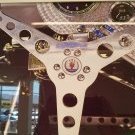-
Available Subscriptions
-
Have you checked out Joe's Latest Blog?
-
By Joe Marconi in Joe's Blog0 commentsIt always amazes me when I hear about a technician who quits one repair shop to go work at another shop for less money. I know you have heard of this too, and you’ve probably asked yourself, “Can this be true? And Why?” The answer rests within the culture of the company. More specifically, the boss, manager, or a toxic work environment literally pushed the technician out the door.
While money and benefits tend to attract people to a company, it won’t keep them there. When a technician begins to look over the fence for greener grass, that is usually a sign that something is wrong within the workplace. It also means that his or her heart is probably already gone. If the issue is not resolved, no amount of money will keep that technician for the long term. The heart is always the first to leave. The last thing that leaves is the technician’s toolbox.
Shop owners: Focus more on employee retention than acquisition. This is not to say that you should not be constantly recruiting. You should. What it does means is that once you hire someone, your job isn’t over, that’s when it begins. Get to know your technicians. Build strong relationships. Have frequent one-on-ones. Engage in meaningful conversation. Find what truly motivates your technicians. You may be surprised that while money is a motivator, it’s usually not the prime motivator.
One last thing; the cost of technician turnover can be financially devastating. It also affects shop morale. Do all you can to create a workplace where technicians feel they are respected, recognized, and know that their work contributes to the overall success of the company. This will lead to improved morale and team spirit. Remember, when you see a technician’s toolbox rolling out of the bay on its way to another shop, the heart was most likely gone long before that.
-
-
Similar Topics
-
By Joe Marconi
Premium Member Content
This content is hidden to guests, one of the benefits of a paid membership. Please login or register to view this content.
-
By Joe Marconi
Premium Member Content
This content is hidden to guests, one of the benefits of a paid membership. Please login or register to view this content.
-
By carmcapriotto
Welcome to the Auto Repair Marketing Podcast with Brian Walker. In this solo episode, Brian discusses the importance of taking massive action during slow business periods.
Drawing from a recent conversation with a shop owner, he shares strategies to combat slow times, including leveraging networking groups like BNI, using your CRM effectively, creating engaging video content, and offering incentives.
Brian also highlights the importance of personal health and well-being, emphasizing that a healthy business owner is crucial for a thriving business.
Tune in for practical tips to help fill your bays and keep your business thriving.
Thank you to RepairPal for sponsoring The Auto Repair Marketing Podcast. Learn more about RepairPal at https://repairpal.com/shops
Lagniappe (Books, Links, Other Podcasts, etc)
Greg Buckley at Buckley's Auto Center : https://www.youtube.com/@BuckleysAutoCare/featured
Charlie's Foreign Car
https://www.youtube.com/@fixingcars
Royalty Auto Service
https://www.youtube.com/@theroyaltyautoservice
Dave’s Auto Center
https://www.youtube.com/@DavesAutoCenterCenterville
How To Get In Touch
Group - Auto Repair Marketing Mastermind
Website - shopmarketingpros.com
Facebook - facebook.com/shopmarketingpros
Get the Book - shopmarketingpros.com/book
Instagram - @shopmarketingpros
Questions/Ideas - [email protected]
Click to go to the Podcast on Remarkable Results Radio
-
By Changing The Industry
Episode 174 - Balancing Business and Family In A Small Town with Josiah Martin

-
By carmcapriotto
The Weekly Blitz is brought to you by our friends over at Shop Marketing Pros. If you want to take your shop to the next level, you need great marketing. Shop Marketing Pros does top-tier marketing for top-tier shops.
Click here to learn more about Top Tier Marketing by Shop Marketing Pros and schedule a demo:https://shopmarketingpros.com/chris/
Check out their podcast here: https://autorepairmarketing.captivate.fm/
If you would like to join their private Facebook group go here: https://www.facebook.com/groups/autorepairmarketingmastermind
In this podcast episode, Coach Chris Cotton from Auto Fix Auto Shop Coaching emphasizes the importance of seeking inspiration and innovation outside the auto repair industry. He challenges shop owners to break out of their comfort zones and learn from disruptors in fields like hospitality, retail, healthcare, and fitness. Chris discusses how adopting customer-centric approaches and technologies from these industries can transform auto repair businesses.
For instance, he highlights how the hospitality industry's focus on exceptional customer service and personalized experiences can be mirrored in auto repair shops to build stronger customer relationships and loyalty. Similarly, he points out how retail's use of data analytics and customer feedback can help auto shops better understand their clients' needs and preferences, leading to more tailored services and improved satisfaction.
Chris also explores how the healthcare sector's emphasis on transparency and trust can be applied to auto repair, fostering a more open and honest communication channel between mechanics and customers. Additionally, he draws parallels with the fitness industry's use of subscription models and community-building strategies, suggesting that auto repair shops could benefit from implementing similar membership programs to ensure steady revenue and customer engagement.
He encourages proactive learning, attending conferences, and networking with professionals from other sectors. By stepping outside the traditional boundaries of the auto repair industry, shop owners can gain fresh perspectives and innovative ideas that can set them apart from competitors.
The episode concludes with practical steps for implementing these innovative ideas to enhance customer experience and drive positive change in auto repair shops. Chris provides actionable advice on how to start small, such as introducing a customer feedback system or experimenting with new service packages, and gradually scale up these initiatives. He also stresses the importance of continuous improvement and staying adaptable to evolving customer expectations and industry trends. By embracing these strategies, auto repair shops can not only improve their operations but also create a more engaging and satisfying experience for their customers.
The power of looking outside our industry (00:01:05)
Exploring the importance of learning from disruptors in other fields to stay ahead of the curve.
Innovation at the edges (00:03:26)
Discussing how innovation often occurs at the edges of industries and the benefits of looking beyond traditional practices.
Examples of disruptors in other industries (00:04:37)
Exploring examples from healthcare, food and beverage, connected fitness apps, and education to draw insights for auto repair business.
Implementing ideas in auto repair shops (00:09:41)
Strategies for implementing ideas from other industries, such as networking, adopting technology, experimenting with service models, focusing on customer experience, and empowering the team.
Connect with Chris:
[email protected]
Phone: 940.400.1008
www.autoshopcoaching.com
Facebook: https://www.facebook.com/
AutoFixAutoShopCoachingYoutube: https://bit.ly/3ClX0ae
#autofixautoshopcoaching #autofixbeautofixing #autoshopprofits #autoshopprofit #autoshopprofitsfirst #autoshopleadership #autoshopmanagement #autorepairshopcoaching #autorepairshopconsulting #autorepairshoptraining #autorepairshop #autorepair #serviceadvisor #serviceadvisorefficiency #autorepairshopmarketing #theweeklyblitz #autofix #shopmarketingpros #autofixautoshopcoachingbook
Click to go to the Podcast on Remarkable Results Radio
-
-
-
Similar Tagged Content
-
- 0 comments
- 2,128 views
-
- 1 reply
- 3,045 views
-
- 3 replies
- 2,102 views
-
- 4 replies
- 2,637 views
-
- 0 replies
- 1,530 views
-
-
Our Sponsors


















Recommended Posts
Create an account or sign in to comment
You need to be a member in order to leave a comment
Create an account
Sign up for a new account in our community. It's easy!
Register a new accountSign in
Already have an account? Sign in here.
Sign In Now